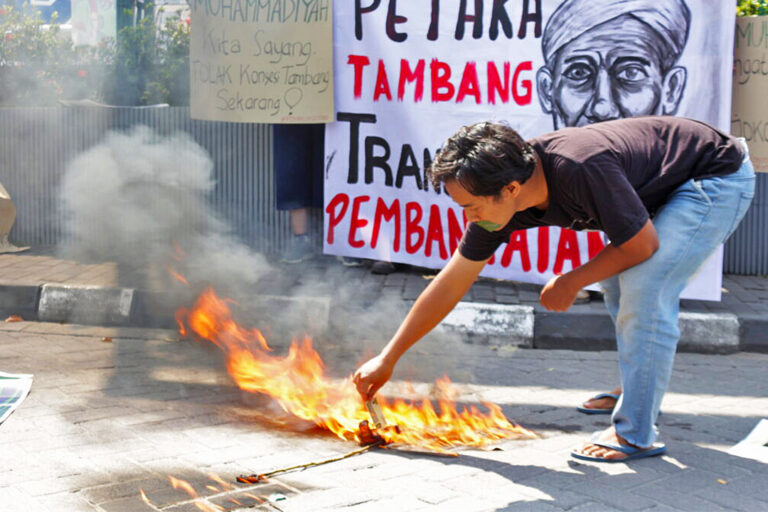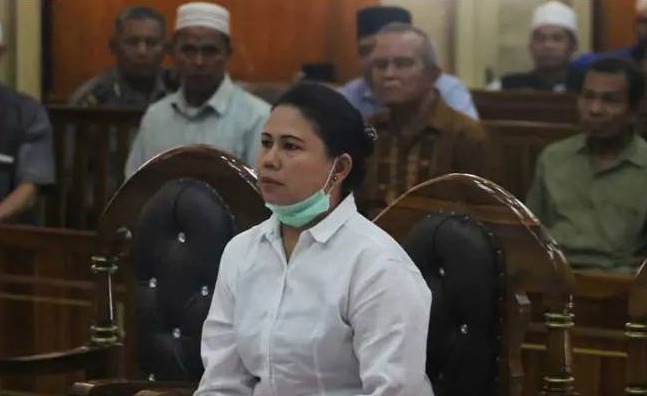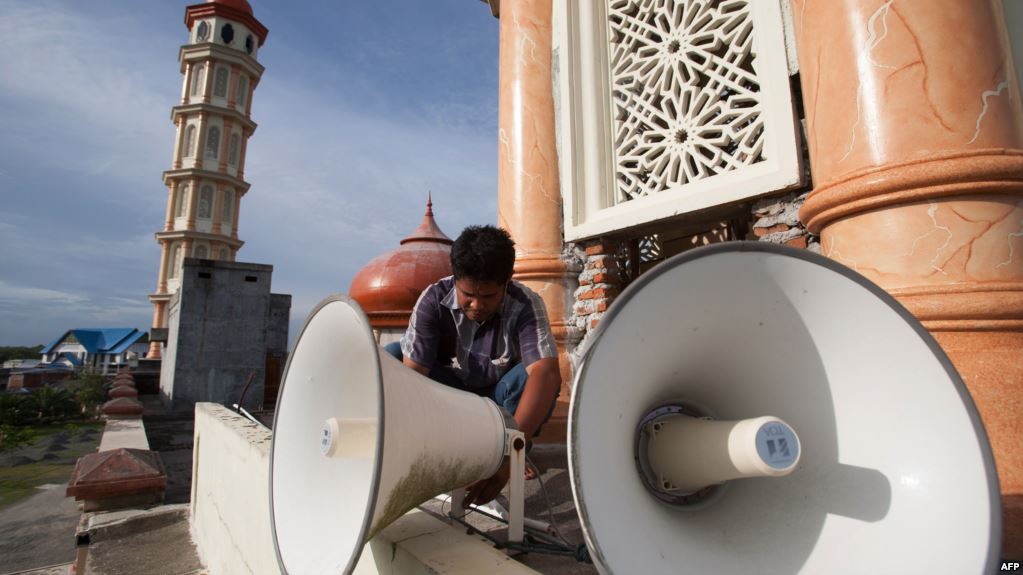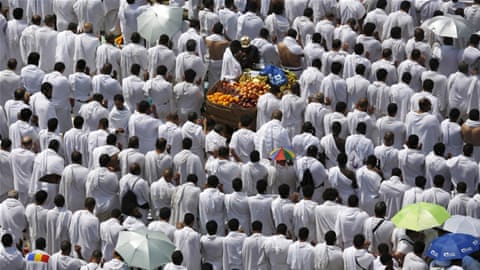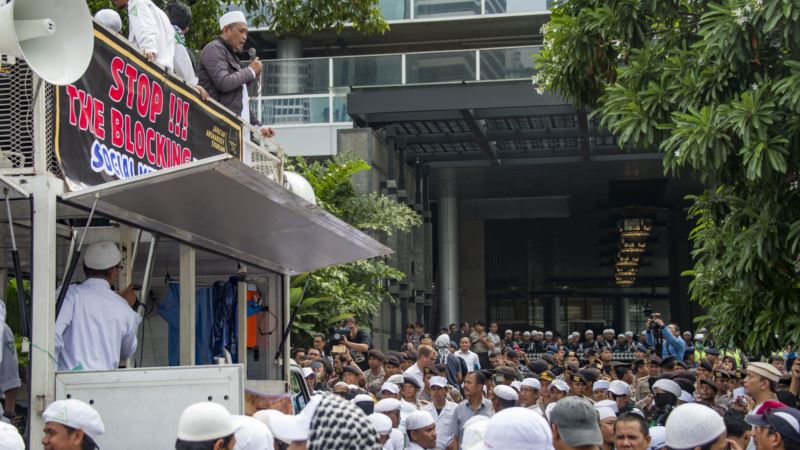- In early August, several youth organizations affiliated with Muhammadiyah, Indonesia’s second-largest Islamic organization, released a public petition calling on its leadership to cancel its plans to operate coal mines.
- The decision by the Muhammadiyah leadership board was made in July after Indonesia’s president, Joko Widodo, amended mining rules to enable religious organizations to enter the mining industry.
- Grassroots activists and some senior member of the organization told Mongabay the move threatens to undermine Muhammadiyah’s extensive charity and advocacy work, in addition to environmental commitments the group made in recent years.
TRENGGALEK/YOGYAKARTA, Indonesia — Indonesia’s second-largest Islamic organization faces a growing backlash following a decision to enter the coal mining industry, with more than 1,000 young Islamic activists from a mining district the latest to campaign against the move.
“Extractive mining causes massive global climate change, environmental damage, declining water quality, and triggers various forms of social conflicts for communities in mining areas,” the declaration by Muhammadiyah youth activists in the Java district of Trenggalek stated.
Two Muhammadiyah student organizations in Trenggalek and the young women’s wing of the organization, Nasyiatul Aisiyah, were among five signatories to the declaration on Aug. 4 calling on the leadership of Muhammadiyah to reverse its decision to operate mines.
You may be interested
Muhammadiyah has branches in the hundreds of districts across Indonesia, but the declaration by the youth wings in Trenggalek has garnered attention because they originate from an area set to undergo extensive land-use change due to gold mining.
In 2019, the Ministry of Energy and Mineral Resources authorized an operating permit for a 12,803–hectare (31,637-acre) exploration area in Trenggalek, overlapping with protected forests and water catchment areas.
The declaration by the activists in Trenggalek was released a day after Mongabay confirmed the suspension of a copper mine just 100 kilometers (60 miles) away in Pacitan district, where scores of farmers have endured economic ruin after mining waste flooded down-valley rice fields.
In October 2021, Trenggalek residents blocked a main road to protest a scheduled meeting between the local government and the permit holder, Australian-owned mining company PT Sumber Mineral Nusantara.
Muhammadiyah was one of the organizations that joined the protest, Mongabay reported in 2021.
Arifin, the head of Muhammadiyah’s Trenggalek youth branch, said Muhammadiyah’s participation in the mining industry would damage their collective efforts to advocate against the opening of the gold mine in Trenggalek by Sumber Mineral Nusantara.
“Whatever happens, together with the Trenggalek People’s Alliance, we will continue to fight,” Arifin said.

Pit stop
Indonesia is home to almost half the world’s nickel reserves, as well as to major deposits of copper, gold and tin. It is also the world’s largest exporter of thermal coal, making the extractive sector essential to the Southeast Asian nation’s economic growth.
Indonesian President Joko Widodo has overseen rapid development of joint ventures between his country and mainly Chinese mining companies to enable Indonesia’s share of global nickel production to rocket from 5% in 2015 to around half the world’s total last year.
That expansion in nickel mining has swelled government revenues and created thousands of jobs, but at the cost of immense pollution in Indonesia’s Maluku and Sulawesi regions, home to most of the country’s nickel reserves.
On May 30, Jokowi, as the president is popularly known, revised Indonesia’s mining regulations to allow the country’s religious organizations to operate mining concessions.
The reform, which was led by then-investment minister Bahlil Lahadalia, swiftly sparked controversy amid allegations of impropriety in Bahlil’s handling of scores of cancelled and reissued mining permits. Bahlil has since been appointed Indonesia’s minister of energy and mines.
Acquiescence by Muhammadiyah has sparked internal divisions and drawn sharp criticism, particularly from its younger members and local chapters in areas directly impacted by mining activities.
Indonesian civil society groups claim the decision to allow religious organizations like Muhammadiyah and Nahdlatul Ulama, which is by far Indonesia’s largest faith group, to operate mines was part of a political deal to secure their support for Jokowi’s ally, Prabowo Subianto, who won the country’s presidential election in February by a landslide.
Following the announcement of the rule change, both Muhammadiyah and Nahdlatul Ulama announced they agreed in principle to assume control of mines in Kalimantan, the Indonesian part of Borneo Island.
The two organizations claim a combined following of 160 million people in the world’s largest Muslim-majority country.

The pits
In response, several members of both organizations told Mongabay they would oppose the decision to move into coal mining.
Reasons given for the opposition included past edicts published by the leadership of Muhammadiyah and Nahdlatul Ulama on biodiversity and climate change.
Others cited conflicts of interest, emphasizing that local clergy are usually at the forefront of advocating on behalf of communities affected by mining damage or land conflicts with large companies.
Eko Cahyono, a sociologist from the Bogor Institute of Agriculture (IPB) and a researcher at the Sayogjo Institute, an NGO, said there was clear dissonance between the decision on coal taken by Muhammadiyah elites and the mood in the grassroots.
“While the leadership has accepted it,” Eko told Mongabay Indonesia, “the sentiment on the ground is quite the opposite.”
Like many in Indonesia, Eko said the highly unusual reform to furnish religious organizations with lucrative mining deals was a government tactic for political consolidation.
Civil society groups have expressed anxiety that by co-opting mass organizations that could otherwise act as checks on power, the strategy may further undermine Indonesia’s democratic integrity.

Pit boss
“What has yet to be appreciated is that NU and Muhammadiyah are actually going to be facing [off against] their own people who will be affected by mining,” Eko said.
On July 27, the Cik Ditiro Forum, a coalition of civil society groups, held a silent protest in the city of Yogyakarta, where Muhammadiyah is headquartered, against the organization’s mining decision. Activists flanked by police officers wore green tape over their mouths, symbolizing the green of Muhammadiyah’s logo.
“Long live Muhammadiyah, don’t earn a living from mining,” one banner held by the demonstrators read.
Masduki, the organizer of that demonstration and a communications professor at the Islamic University of Indonesia (UII), said the move into mining would damage Muhammadiyah’s capacity to participate in Indonesia’s democracy, in addition to causing harm to local environments.
“In the case of this mining, we can see the disease, the threat: there are three indications,” Masduki said. “First, mining is destructive; second, mining is destructive; third, mining is destructive. There’s nothing good about it.”
Banner image: Action by Muhammadiyah cadres in Jogja protesting the second largest Islamic religious organization in Indonesia receiving mining permits from the government. Image by Toto Sudiarjo/Mongabay Indonesia.
This story was reported by Mongabay’s Indonesia team and first published here on our Indonesian site on Aug. 6, 2024.
Muhammadiyah latest faith group to join Indonesia religious coal rush
Credits

